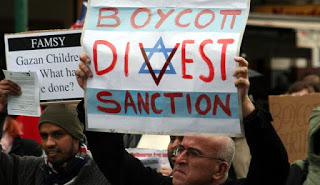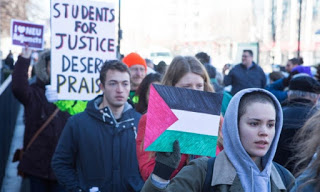In
recent weeks, Netanyahu has stepped up the war against Boycott Divestment and
Sanctions (BDS). There was already a
piece of legislation that made it a civil offence, which the Israeli Supreme
Court ruled was compatible with free speech.
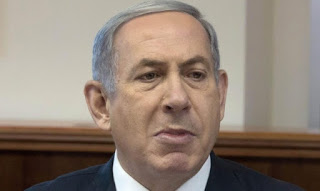 |
| BDS is a strategic threat |
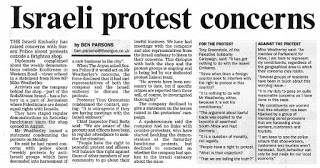 |
| Debate in Brighton’s local Argus between Tony Greenstein and the Tory MP for Hove Michael Weatherley |
Netanyahu has gone one further and branded BDS a ‘strategic threat’ alongside
Iran’s nuclear weapons, Hamas and no doubt a few of Israel’s other enemies. How genuine is this or is it another example
of Netanyahu’s need for another ‘existentialist’ enemy?
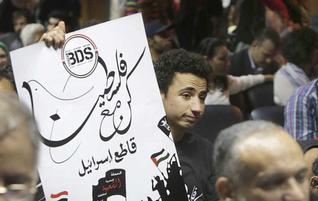
Egyptian boy displays poster

There
is no doubt, as Omar Barghouti says, that on one level it is absurd to equate a
peaceful tactic of protest with the alleged Iran threat. But on the other hand there is some substance
to Zionist fears.
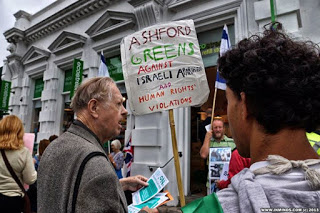 |
| Brighton picket of the Sodastream shop |
The
movement for BDS has, in 10 years, come a long way. What began in Britain with a narrow vote by
the Association of University Teachers to boycott 6 Israeli universities over
their complicity with the Occupation has mushroomed. Virtually every trade union in Britain has a
policy in support of BDS.
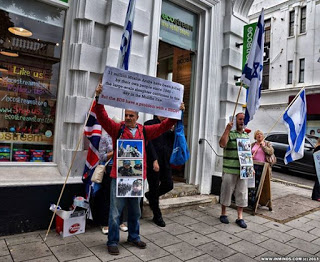 |
| A racist Israeli who called a Palestinian demonstrator a ‘primitive’ and a fundamental Christian were the only supporters of Brighton’s Sodastream shop |
The academic boycott is feared, rightly, by Israeli universities which have been complicit in the Occupation. Only last week it was described as ‘an iceberg’ with a small part visible but a much larger hidden boycott which manifests itself in not holding conferences in Israel and other examples of non-co-operation with Israeli academia.
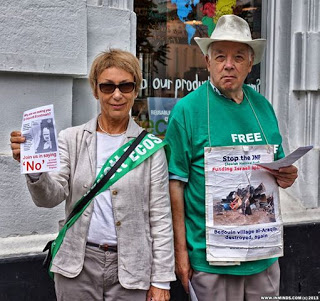 |
| Picket of Brighton’s Sodastream shop |
The
time when the trade unions were a bastion of support for Zionism are long since
gone. It was about 6 years ago that the
then General Secretary of the TUC, Brendan Barber, went from the Trade Union
Friends of Israel to the Trade Union Friends of Palestine to convey the message
that BDS was wrong. I remember heckling
him and asking what he would put in its place.
I got no answer. It was in 2007
and 2008 that I spoke in support of BDS to the Unison National Conference which
voted by about 4-1 to support our motion.
Although
so far the economic impact of BDS has been limited, Veolia has pulled out of
the Jerusalem Light Railway and Orange, according to recent stories, wants to
do the same and G4S has been forced to agree to stop maintaining detention
centres, Israeli trade has largely been unaffected. Europe has made noises but continued to trade
in settlement produce. In the UK we have
forced the Ahava shop in Covent Garden to close and in Brighton the
Ecostream/Sodastream shop to do likewise, despite a vigorous Zionist picket of
far-right Israel supporters and loony fundamental Christians.
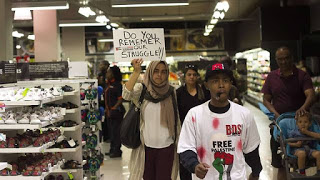 |
| Protest in South Africa’s Woolworth’s shop |
But
the Cultural BDS has been far more successful with acts like Gill Scott-Heron,
Elvis Costello, Stevie Wonder and Roger Waters boycotting Israel. The threat of this being extended to sport
via a suspension by FIFA caused great consternation in Israel. Stephen Hawking, who has spoken on 4
occasions in Israel, pulled out of a speaking engagement.
Although
it hasn’t had a massive economic impact, the campaign amongst students and at
academic institutions has had an immense symbolic effect. The vote by the National Union of Students
Executive to support BDS was unprecedented.
It follows campus victories at places like Sussex University. In the USA although no university has
divested, there have been a number of victories on different campuses in secret
ballots.
is arguable that until the very end, the Boycott in South Africa was also more politically
than economically damaging. It
undermined the confidence of Apartheid’s supporters and their own faith in
their system. Israeli and Zionist arrogance
knows no bounds, as is the case with most settler-colonial states. Appeals to reason and their good faith fall
on stony ground. It is only through
coercion that they can be forced to pull back.
The 67 year old Occupation has an Israeli wide consensus. The
2-State solution, which was never a feasible option, since it didn’t deal with
the core racism of Zionism, is now officially acknowledged as dead in the
water. That means that Israel faces the
Apartheid scenario – it can accept that the Palestinians of the Occupied
Territories are entitled to full
democratic rights, in which case a Jewish state is no more, or it can
prioritise a Jewish state above everything else in which case Israel is an
Apartheid state. Although not saying so,
Israel has already made this decision and it has chosen the latter option.
What
worries Israel more than anything else is that losing the argument on campuses,
especially in the US, means losing the argument amongst tomorrow’s opinion
makers. Israel’s alliance with the USA
relies on it being a strategic military ally.
In this it is correct and it will take a lot to shift the US from such a
position. But if there were to be a
revolutionary upsurge in the Middle East, with the Saudi and Egyptian regimes toppled, along with the client
Gulf states, then Israel’s role might be perceived as very different.
Eighteen
months ago Norman Finkelstein foolishly
described BDS as a cult. It is clear
that he regrets these remarks now and has fallen into line. At that time he had, as he made clear in a
talk given to a packed audience at the Institute of Education, illusions that
John Kerry was going to be able to achieve a 2-State solution and he certainly
did his best. However the best efforts
of the Obama administration foundered on the rocky shores of Israeli intransigence. Today no one has such an illusion. BDS is the only game in town.
It
is noticeable that the softer non/anti-Zionist groups like Jews 4 Justice for Palestinians
and Jewish Voices for Peace in America have also come out in favour of
BDS. As Netanyahu’s reaction has shown,
the only thing that worries these racists is a movement which does indeed
challenge the legitimacy of the Israeli state.
We should not be afraid of saying that the Israeli state is indeed
illegitimate. It is founded on the
dispossession of the Palestinians, it is thoroughly racist to the core, it is
willing to engage in limitless violence and should, like the equivalent
Apartheid state in South Africa disappear into the mists of time. That is not the same thing as saying that Israeli
Jews don’t have the right to live in Palestine – clearly they do. But they don’t have the right to do so as
oppressors.
Despite
the undoubted bombast and hysteria of Netanyahu’s campaign against BDS we should
welcome the fact that we have at last found a tactic that has the potential to
challenge the core racism of the Israeli state.
Tony Greenstein
over its calls for Israel to be boycotted for its occupation of Palestinian
territories
minister Binyamin Netanyahu – have turned on the BDS, using language usually
reserved for Hamas or Iran’s nuclear programme. Photograph: EPA
Israel and key international
supporters have sharply ratcheted up their campaign against the Palestinian-led
Boycott Divestment and Sanctions (BDS) movement, with senior Israeli officials
declaring it a strategic threat.
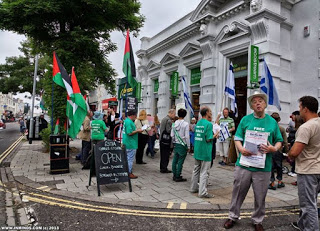 |
| Palestine Solidarity Campaign picket of Sodastream |
Using language the Israeli government usually reserves
for the likes of Hamas or Iran’s nuclear programme, senior figures – including
the prime minister, Binyamin Netanyahu, and a key
backer in the US, casino magnate Sheldon Adelson – have turned on the movement,
which is prominent on university campuses and among international trade unions.
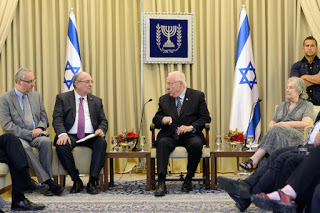 |
| Israeli President Reuven Rivlin with Heads of Israeli Universities |
The moves came as the UK’s National Union of Students (NUS) voted on
Tuesday to formally ally itself with the aims of BDS. Following the
vote, Hebrew media reported that Israeli MPs were due to hold a special session
in the Knesset to discuss the issue.
The non-violent grassroots movement, founded
with the support of dozens of Palestinian organisations, is modelled
on South African anti-apartheid campaigns and calls for an end to the
occupation, equality for Palestinian citizens of Israel, and a resolution for
Palestinian refugees of 1948.
Israeli critics point to the call for a right to return
and the opposition of some leaders of the movement to a two-state solution –
which they describe as a mistake – as evidence that BDS is antisemitic.
have loftily dismissed the impact of BDS – which seeks to persuade businesses,
artists, governments and academic institutions to boycott Israel over its long
occupation of the Palestinian territories – Israel’s new rightwing government has in
recent days singled out the movement for criticism.
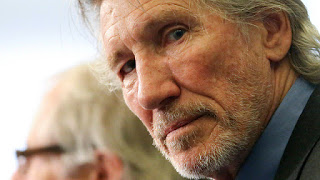 |
| Roger Waters of Pink Floyd has been an important advocate of musicians boycotting Israel |
The issue appears to have been given added impetus since
Palestinian efforts to have Israel suspended from the scandal-ridden world
football organisation Fifa failed on Friday.
 |
| An empty Sodastream shop in Brighton – no one but Zionists wanted to shop in it |
Comments by senior Israeli politicians over the last
week have been amplified in the Hebrew media by sympathetic commentary by columnists.
Among those who have allied themselves with the latest efforts are the mass
circulation Israeli paper Yedioth Ahoronoth – which earlier this week allied
itself on its front page with “Fighting the boycott” – and its rightwing
columnist Ben-Dror Yemeni, who has echoed
the comments of officials.
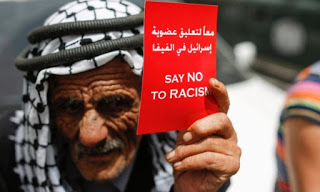 |
| Giving the red card to Israeli football at FIFA |
“The success of BDS,” Yemini wrote earlier this week,
“is particularly impressive because it is a movement that uses the language of rights,
but deals in practice with denying Israel’s right to exist. The result is a
major deception.”
The latest rhetoric has coincided with growing evidence
of pro-Israeli activism over BDS, not least in the US. Last week, a new website
emerged whose aim was to identify US college students active in the BDS
movement with the explicit aim of identifying then to
future possible employers. It was not clear who was behind the site.
This weekend, Adelson will reportedly convene a meeting of
super wealthy pro-Israel donors for a summit in Las Vegas on
countering the influence of BDS and similar movements on US campuses.
boycott movements to historic “anti-semitism”, echoing remarks that Netanyahu
made in his keynote address to the US pro-Israel lobby group AIPAC last year,
when he described BDS as being on the “wrong side of the moral divide” while
predicting that the “movement will fail”.
Website targets pro-Palestinian students in
effort to harm job prospects
The latest rhetoric was immediately condemned by
Barghouti, who dismissed the recent moves as a “panic-driven, racist and
patently propagandistic Israeli attack on the movement”.
He told the Guardian: “Placing a non-violent human
rights movement that seeks freedom, justice and equality on par with the
so-called Iranian ‘nuclear capacity’ as a ‘first-rate strategic threat’ – as
Israeli president Reuven Rivlin announced a few days ago or as the new minister
of strategic affairs and public security in the far-right Israeli government
Gilad Erdan tweeted on his first day on the job – reflects Israel’s failure in
hindering the fast growth of BDS.
“It also betrays
Israel’s inherent inability to face such popular, anti-racist, human
rights-based and nonviolent challenges to its regime of oppression.”
Israeli officials told the Guardian that the focus on
BDS was not an acknowledgement of its success but rather the reaffirmation of a
principal of “moral outrage” both over the recent move by the NUS and by
efforts to have Israel suspended from Fifa.
That, however, has led to accusations from critics that
Israel is deliberately conflating the BDS movement with separate Palestinian
efforts to hold Israel accountable for the occupation.
Facing growing warnings of international isolation in
the absence of a peace process with the Palestinians and amid continued
settlement building in the occupied territories, the latest moves appear
designed to conflate BDS with separate initiatives by Palestinian diplomats to
internationalise support for the end to occupation and for the creation of a
Palestinian state in global forums.
One Palestinian official familiar with efforts on the
international stage said he believed the latest effort was aimed not only at
BDS but at the wider Palestinian effort to promote its case in the
international criminal Court, the UN and Fifa.
“They are trying to combine all the efforts to hold
Israel accountable into creating a monster that is not there yet,” the official
said. “If ask the Palestinian leadership, some love BDS as a movement, others
hate it. I think what Netanyahu is trying to do is create an idea that even if
you believe Palestinian moves in international forums are legitimate, they are
undermined because BDS – in the Israelis argument – seeks to ’destroy state of
Israel’.”
Netanyahu’s declaration of war on BDS is its
negate the direct contribution of Israeli actions to the movement’s recent
surge.
|
By Chemi Shalev | Jun. 2, 2015 |
3:27 PM |
Ouda/Wikimedia Commons
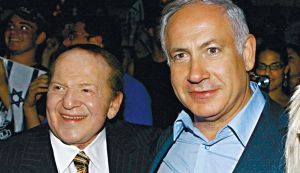 |
| Benjamin Netanyahu with Sheldon Adelson, left Photo by Eyal Warshavsky / BauBau |
just scored a tremendous victory.
against the delegitimization of Israel and calls for a “wide front” to combat
boycott, and then, within 24 hours, Sheldon Adelson convenes an emergency
summit in Las Vegas to fight BDS on university campuses – as Nathan Guttman
revealed in the Forward on Monday – BDSers can smugly tell themselves that
they’ve finally made it. From a nuisance, perhaps even a danger, they have been
elevated the status of existential threat, on a par, almost, with Iran and
Hezbollah.
connected, no doubt, to the near-death experience that Israelis went through on
Friday as FIFA came perilously close to expelling them from international
soccer. In Israeli political parlance, it also represents a certain switching
of roles: Hitherto it was the left who was cast as Cassandra, issuing repeated
warnings of impending condemnations and boycotts in the international arena,
which the right shrugged off as no more than transparent political
scaremongering. In a 2014 Peace Index poll published by the Guttman Center, 71%
of left-leaning Israelis described boycott as a clear and present danger,
compared with only 42% of those on the right. Now – perhaps in preparation for
the post-Iran-nuclear-agreement era – it is the right that looks to turn BDS
into a new rallying cry that proves that the whole world is against us, while
the left will inevitably claim that this is a cynical ploy aimed at diverting
attention from right-wing policies that are the root cause of Israel’s dismal
situation in the first place.
even one major achievement, outside of co-ops or supermarkets here and there,
where the short-lived boycotts were mainly symbolic anyway. Student bodies in
29 universities have voted on divestment from Israel, with some measure of
success for BDS, especially in California: not one academic institution,
however, has decided or is even weighing to adhere to these decisions. Some
states, such as Indiana, Illinois and Tennessee, have already adopted
anti-boycott legislation, with several others expected to follow suit.
students, is the increasingly virulent debate on camps, which, in some cases,
has deteriorated from criticism to loathing, from anti-Israeli sentiments in
particular to anti-Semitism sentiments in general. Jewish students have also
expressed apprehension about the hostility of lecturers, whose academic unions
are increasingly preoccupied with arguments for and against boycotts. But
contrary to the functionaries for whom this battle is also a livelihood, most
parents don’t care so much about Israel winning or Palestine losing: they just
want their kids to be left in peace so they can finish their degree.
Netanyahu is right in saying that those running BDS don’t object to Israel’s
deeds but to its very existence. But his claim that Israeli actions and
policies don’t nourish the boycotters, don’t facilitate its enlistment of new
recruits and don’t make the defense of Israel that much harder is both
disingenuous and childish. Regardless of background and cause, it’s hard to
claim with a straight face that the cessation of the peace process, the death
and destruction in Gaza, the campaign against African migrant workers, the Tel
Aviv riots of Ethiopians, Netanyahu’s speech in Congress, and, perhaps, most
injurious of all, his miserable appeal against Israeli Arabs on Election Day –
that all these haven’t provided highly combustible gasoline to BDS propaganda
in the past year alone.
its 50th anniversary. Israelis and Americans have learned to conveniently
repress awareness of the ongoing denial of political rights from the
Palestinians or to view it as a force majeure. They can no longer fathom its
malignant influence on young and impressionable hearts and minds that are
looking at the Israeli-Palestinian conflict from afar.
supporters abroad to fight BDS before it becomes a real danger – the question
is what is the best way to go about it. The emergence of a controversial
figure such as Adelson on the front lines, for example, cannot but paint the
summit he is convening as a right-wing, conservative even Republican effort,
even if other partisan figures, such as the pro-Democrat Haim Saban, are
involved. According to report last week by Rosie Gray in Buzzfeed, Adelson and
his wife Miriam are looking to appoint their favorite Rabbi Shmuley Boteach to
lead legions of boycott-fighting students tentatively known as “Campus
Maccabees”.
to organize impressively massive events – like the one put on by the
Adelson-funded Israeli American Council (IAC) in honor of Israeli Independence
Day in New York on Sunday – but it would equally also deter moderate students
from joining the cause. In several campuses, BDS campaigns have been beaten
back only with the help of students identified with J Street U, whose parent
group is ostracized and shunned by most of those identified with, or dependent
on, Adelson.
Foxman warned against quick fix solutions. “This fantasy of a magic wand will
sap the energy from what is truly needed: a comprehensive approach”. Foxman
says the American Jewish community should “reward universities and institutions
who stand up to the boycott” and work to deepen the trade, cultural and
scientific ties between Israel and academic and other institutions. Foxman
makes no mention of the fact that the Israeli government could take steps that
could dramatically impact the fortunes of BDS, either because he doesn’t think
this is the case, because he doesn’t think it is his role to say so, or because
he is biding his time until the end of his 28-year stewardship of the ADL in
July.
